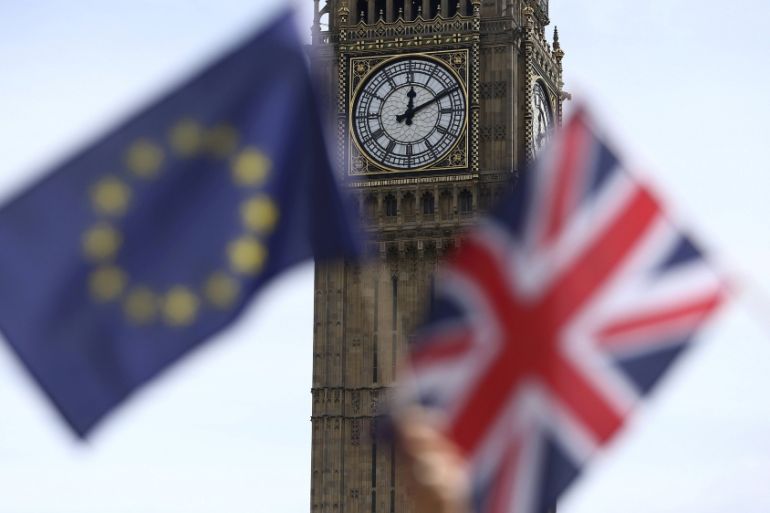Brexit Q&A: All you need to know
An in-depth look at all the key issues surrounding the historic vote that could shape British-EU ties for generations.

The UK is holding a referendum on whether the country should leave the European Union, a process often referred to as “Brexit”.
Today’s vote is seen as more important than a general election, because it can shape Britain’s relationship with Europe and the rest of the world for generations to come.
| |
- What does ‘Brexit’ stand for?
- What will be the referendum question?
- Who will be voting?
- Who wants to remain and who wants to go?
- Who is likely to win?
- What are the arguments? Economy – Immigration – Jobs – UK’s global role
- What will happen after Brexit?
What does ‘Brexit’ stand for?
The term is a commonly used abbreviation for Br- itish Exit from the EU.
What will be the referendum question?
“Should the United Kingdom remain a member of the European Union or leave the European Union?” will be the referendum question.
Keep reading
list of 4 itemsNorthern Ireland agreement could end deadlock, restore government
Forced to become British: How Brexit created a new European diaspora
Number of Britons regretting Brexit hits new record high: Survey
Who will be voting?
British, Irish and Commonwealth citizens over 18 who are UK residents, along with UK citizens living abroad who have been on the electoral register in the UK in the past 15 years will be allowed to vote.
EU citizens will not be allowed to vote, even if they are UK residents.
Some voters have already cast their votes by post.
![Cameron leads the 'Remain' campaign while Johnson personifies 'Leave' [Reuters/Toby Melville]](/wp-content/uploads/2016/06/716785d4e3804386b12f7d1793ee5af1_18.jpeg)
Who wants to remain and who wants to go?
David Cameron, the British prime minister, and most members of the Conservative Party’s government, including Chancellor George Osborne, are backing the “Remain” campaign.
The Labour Party and its leader Jeremy Corbyn, the Liberal Democrats, the Green Party, Plaid Cymru, Sinn Fein and the Scottish National Party are also supporting Britain’s continued membership of the EU.
All living former British prime ministers, from both political parties, are also “Remain” backers.
OPINION: Brexit and the spectre of Europe’s ugly nationalism
The “Leave” camp has two prominent leaders: Michael Gove, the secretary of state for justice, and Boris Johnson, former London mayor. Nearly half of the Conservative MPs are also backing the “Leave” campaign.
Far-right, anti-immigration party UKIP and its populist leader Nigel Farage are backing Brexit, along with other far-right groups in the UK, such as Britain First.
READ MORE: Brexit or Bremain? Covering the EU referendum
British media is divided on the issue, just like the British public.
![Betting markets think a 'remain' vote is almost twice as likely as Brexit [Joerg Carstensen/AP]](/wp-content/uploads/2016/06/cacf0ca7a66741c5b2eb221dc3599c50_18.jpeg)
Who is likely to win?
Three new referendum polls released on Saturday suggest that the result still hangs in the balance.
|
|
A YouGov poll found support for the “Remain” camp is up five points to 44 percent, while support for the “Leave” camp has fallen three points to 43 percent.
Online polls by Opinium and YouGov suggest the two sides are neck and neck. A poll by Opinium has both “Remain” and “Leave” on 44 percent.
On the other hand, betting markets in Britain are suggesting that a “Remain” vote is almost twice as likely as Brexit.
What are the arguments?
Economy
Remain: The official campaign for the UK to stay in the EU, Britain Stronger in Europe , argues that being in the EU boosts the British economy and leaving would be a “big mistake”.
The campaign predicts that a Brexit will lead to an economic recession, resulting in sharp public spending cuts, job losses and years of financial insecurity.
OPINION: Here’s why Brexit matters to GCC countries
The Treasury has recently claimed that leaving will cost the average British household the equivalent of £4,300. The Bank of England has also warned of a recession.
|
|
‘An independent Britain will be better able to cope’
Leave: The official “Leave” campaign, Vote Leave , argues that an exit will actually boost the British economy.
Gove, the leader of the campaign, claims that the “Remain” camp’s warnings about Brexit’s possible effect on the economy are wrong.
“There are economic risks if we leave, economic risks if we remain. I don’t think there will be a recession as a result of a vote to leave,” he told The Daily Telegraph in a recent interview .
“But at some point in the future, it may be the case that global economic factors cause problems,” he said.
“An independent Britain will be better able to cope with those strains.”
Brexit campaigners claim that the EU costs the UK over £350m each week – nearly £20bn a year.
They argue that the UK can instead spend this money on the NHS, or on things like flood defences.
Jobs
Remain: The “Remain” camp argues that being able to trade freely across the EU helps UK businesses grow and create jobs, giving British citizens more opportunities and financial security.
More than three million UK jobs, one in every 10, are linked to Britain’s trade with the EU, they say. And they predict that being in the EU will create 790,000 more UK jobs by 2030, while leaving will cause up to 950,000 UK jobs to be lost.
On the other hand, Vote Leave campaigners say the danger to UK jobs has been over-exaggerated and predict that a Brexit will create 300,000 jobs in the UK.
If Britain decides to leave, they say it “will be able to create hundreds of thousands more jobs in the UK” by negotiating trade deals with countries individually.

Immigration
Leave: Vote Leave campaigners say that Britain can never control immigration until it leaves the EU, “because freedom of movement gives other EU citizens an automatic right to live in the UK”.
“The EU does not have the legal structure needed to cope with the current migrant crisis. If we Vote Leave, we will take back control,” they say.
|
|
They propose to implement an Australian style, point-based immigration system after Brexit.
In the aftermath of the recent murder of Labour MP Jox Cox, campaigners for Brexit faced accusations that they caused the debate about immigration to become too toxic.
Recently, UKIP unveiled a poster showing a queue of refugees with the slogan “Breaking point” and a plea to leave the EU.
The “Remain campaign” called the poster xenophobic and racist and even Vote Leave leader Gove said: ” When I saw that poster, I shuddered.”
Baroness Sayeeda Warsi, former Conservative Party chairwoman and the first Muslim woman to serve in the Tory cabinet, recently defected to the “Remain” camp.
She cited ” hate and xenophobia” as the reasons for changing her position.
‘We have control of our borders’
Remain: The “Remain” camp claims leaving the EU will not stop or even reduce immigration to the UK in any way.
“At the moment we have control of our borders as we are out of the Schengen. Most of our immigration is from outside the EU, this is not linked to our membership of the EU,” they say.
Britain Stronger in Europe campaigners also claim that if the UK adopts the Australian points system proposed by the “Leave” camp, the levels of immigration would “double”.
![Obama has urged Britain to stay in the European Union [Andy Rain/Reuters]](/wp-content/uploads/2016/06/919785a409784a78bca5203d7bbdfcc3_18.jpeg)
Britain’s place in the world
Leave: The “Leave” camp hold the view that Britain, the world’s fifth largest economy, a member of the UN Security Council and the possessor of a nuclear arsenal, does not need the EU to be a key player on the international stage.
Vote Leave campaigners say that in case of a Brexit, Britain will regain its seat in several international bodies where it is currently being represented by Brussels, and gain “greater international influence to push for greater international cooperation”.
READ MORE: Obama’s Brexit comments spark controversy in UK
Remain: Conversely, “Remain” campaigners argue that being in the EU gives Britain a more powerful role in the world and a say in major global decisions.
Currently, leaders of all EU member states including German Chancellor Angela Merkel, along with the leaders of India, Canada and Australia, are backing the remain camp.
The secretary-general of NATO and US President Barack Obama want Britain to stay in the union. Presumptive Democratic presidential nominee Hillary Clinton also supports the “Remain” camp.
Currently, Republican Presumptive Presidential nominee Donald Trump and France’s far-right leader Marie Le Pen are the only international backers of the campaign for Britain to leave the EU.
![Once Article 50 was triggered, the terms of Brexit would be negotiated [EPA/ Laurent Dubrule ]](/wp-content/uploads/2016/04/399242edc44f4906bbea075edbd76974_18.jpeg)
What will happen after Brexit?
Leave: If the “Leave” campaign wins the referendum on Thursday, analysts expect that Cameron could face calls to resign immediately or at least set a timetable for his departure.
On the economy, the expectation is that there would be a plunge in the value of the pound and share prices in the immediate aftermath of a Brexit, causing the Bank of England to raise interest rates.
Article 50 of the Lisbon Treaty, which guides member states wishing to leave the EU, is a vague map towards the exit door.
Cameron previously said that in case of a “Leave” vote, the government would invoke this article immediately and start the long and complicated Brexit process.
“There is no turning back if we leave,” he wrote in a Sunday Telegraph article . “If we choose to go out of the EU, we will go out – with all of the consequences that will have for everyone in Britain.”
But, even if the British government invokes article 50 on June 24, it would take Britain up to two years to actually leave the EU.
During the two-year negotiation period, EU laws would still apply to the UK.
The UK would continue to participate in other EU business as normal, but it would not participate in internal EU discussions or decisions about its own withdrawal.
Once Article 50 is triggered, the terms of Brexit will be negotiated not by British politicians or diplomats, but by the other 27 nations of the EU.
And, when the members are ready, they will present the British government with a departure agreement on a “take it or leave it” basis.
|
|